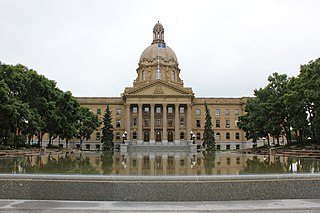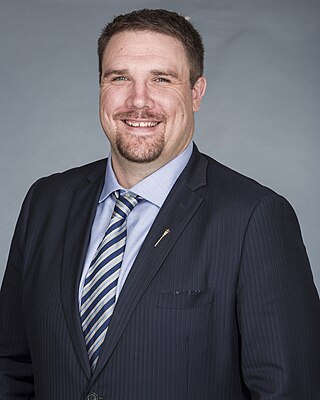Collective bargaining is a process of negotiation between employers and a group of employees aimed at agreements to regulate working salaries, working conditions, benefits, and other aspects of workers' compensation and rights for workers. The interests of the employees are commonly presented by representatives of a trade union to which the employees belong. A collective agreement reached by these negotiations functions as a labour contract between an employer and one or more unions, and typically establishes terms regarding wage scales, working hours, training, health and safety, overtime, grievance mechanisms, and rights to participate in workplace or company affairs. Such agreements can also include 'productivity bargaining' in which workers agree to changes to working practices in return for higher pay or greater job security.
The National Union of Public and General Employees (NUPGE) is a Canadian trade union. Taken in total it is the second largest union in Canada. Most of its 425,000 members work in the provincial public service sector. Its mission is to monitor provincial and federal labour laws and developments as well as analyse restructuring of social programs and public services. The national union reports on and contributes to legislation affecting the Canadian workplace.
The Alberta Union of Provincial Employees (AUPE) is a Canadian trade union operating solely in the province of Alberta. With approximately 95,000 members as of March 2019, it is Alberta's largest union. AUPE is primarily a public sector union, with members employed in government, health care, education, boards and agencies, municipalities, and occasionally private companies.

Alberta Investment Management Corporation (AIMCo) is a Canadian Crown corporation and institutional investor established to manage several public funds and pensions headquartered in Edmonton, Alberta. AIMCo was established by an act of the Legislative Assembly of Alberta in 2008 under the government of Progressive Conservative Premier Ed Stelmach.
Alberta Health Services (AHS) is the single health authority for the Canadian province of Alberta and the "largest integrated provincial health care system" in Canada. Headquartered in Edmonton, AHS delivers medical care on behalf of the Government of Alberta's Ministry of Health. It operates 850 facilities throughout the province, including hospitals, clinics, continuing care facilities, mental health facilities and community health sites, that provide a variety of programs and services. AHS is the largest employer in the province of Alberta. In 2019, AHS served 4.3 million Albertans with a staff of 125,000 staff and 10,000 physicians, and an annual budget of $15.365 billion. Sean Chilton is the Acting President and CEO of AHS and reports to Dr. John Cowell, the AHS Official Administrator. The Official Administrator is accountable to the Minister of Health and the Premier.

Rachel Anne Notley is a Canadian politician who was the 17th premier of Alberta from 2015 to 2019. She sits as the member of the Legislative Assembly (MLA) for Edmonton-Strathcona. She was the longest serving member of the legislature by consecutive time in office and leader of the Alberta New Democratic Party (NDP) from October 18, 2014 to June 22, 2024.

The Public Service Salary Restraint Act is an Act of the Legislature of Alberta. The bill was introduced by the Progressive Conservative government.

Jason John Nixon is a Canadian politician and the current Minister of Seniors, Community and Social Services of Alberta. He is member of the Legislative Assembly of Alberta representing the electoral district of Rimbey-Rocky Mountain House-Sundre.

Devin Dreeshen is a Canadian politician and a member of the Legislative Assembly of Alberta, representing the electoral district of Innisfail-Sylvan Lake. He was first elected with 82 per cent of the vote in a by-election in July 2018, and was re-elected in the 2019 Alberta general election to the 30th Alberta Legislature. In the 2023 Alberta general election, Dreeshen was once again re-elected to the 31st Alberta Legislature.

Shane Getson is a Canadian politician representing Lac Ste. Anne-Parkland in the Legislative Assembly of Alberta as a member of the United Conservative Party (UCP). Getson was first elected in the 2019 Alberta general election and subsequently re-elected in the 2023 election.

Rajan Sawhney is a Canadian politician from the United Conservative Party in Alberta. She was elected in the 2019 Alberta general election to represent the electoral district of Calgary-North West in the 30th Alberta Legislature. On April 30, 2019, she was appointed to be the Minister of Community & Social Services in the Executive Council of Alberta. On July 8, 2021, she was shuffled into the Minister of Transportation.

Tyler Shandro is a Canadian politician who served as the minister of justice and solicitor general of Alberta from February 2022 to June 2023. A member of the United Conservative Party (UCP), Shandro was elected to represent Calgary-Acadia in the Legislative Assembly of Alberta in the 2019 provincial election. He was Alberta's minister of health from 2019 to 2021, and minister of labour and immigration from 2021 until he was named justice minister in 2022. He lost re-election in the 2023 provincial election.
Miranda Rosin is a Canadian politician who represented the electoral district of Banff-Kananaskis in the Legislative Assembly of Alberta for the United Conservative Party from 2019 to 2023.

The 30th Alberta Legislative Assembly was constituted after the general election on April 16, 2019. The United Conservative Party (UCP), led by Jason Kenney, won a majority of seats and formed the government. The New Democrats, led by outgoing Premier Rachel Notley, won the second most seats and formed the official opposition. The premiership of Jason Kenney began on April 30, 2019, when Jason Kenney and his first cabinet were sworn in by Lieutenant Governor of Alberta, Lois Mitchell. On October 11, 2022, Kenney resigned, and Danielle Smith, the new leader of the UCP, was sworn in as premier by Lieutenant Governor Salma Lakhani. The 30th Legislature was dissolved on May 1, 2023, triggering a general election on May 29.

The Public Sector Wage Arbitration Deferral Act is a bill, informally known as the "bargaining rights bill", introduced by the Province of Alberta's United Conservative Party (UCP) government under Premier Jason Kenney, during the 30th Alberta Legislature, constituted after the general election on April 16, 2019. Bill 9 was passed on June 20, 2019. According to Alberta Finance Minister Travis Toews, Bill 9 suspends and delays hearings related to wage arbitration for public sector workers until October 31, 2019 in order to allow time for the provincial government to study the August 2019 finance report of the MacKinnon panel. Bill 9 affects 180,000 public service employees in Alberta that are represented by unions in 24 collective agreements.

The premiership of Jason Kenney spanned from April 2019 until October 2022, when Jason Kenney and his cabinet were sworn in by Lieutenant Governor of Alberta, Lois Mitchell. Kenney was invited to form the 30th Alberta Legislature and became the 18th Premier of Alberta, following the 2019 Alberta general election where Kenney's United Conservative Party (UCP) won a majority of seats in the Alberta Legislature leading to the resignation of Premier Rachel Notley. Kenney stepped down as leader of the UCP party on May 18, 2022, after receiving 51.4% of the UCP party members' votes. His premiership ended shortly after Danielle Smith won the subsequent leadership election and was sworn in as premier.
The 2019 Alberta budget, known as the A plan for jobs and the economy, is the budget for the province of Alberta for fiscal year 2019 - 2020. It was presented to the Legislative Assembly of Alberta on October 24, 2019 by Travis Toews, the Minister of Finance of Alberta of the Government of Alberta.

The Health Statutes Amendment Act, 2020, otherwise known as Bill 30, is an omnibus bill introduced on July 6, 2020, by the Canadian province of Alberta's United Conservative Party's (UCP) Minister of Health Tyler Shandro. Its passed its 1st reading on July 6, its 2nd reading on July 23, and its 3rd reading on July 29. It was the last piece of legislation during the spring session of the 30th Alberta Legislature.
DynaLife is a Canadian private healthcare organization, headquartered in Edmonton, where it started as Dynacare Kasper Medical Laboratories (DKML) in the 1980s. It is partly owned by its American-based Laboratory Corporation of America (LabCorp), who acquired Dynacare in 2002. DynaLife has over three thousand employees working at its central laboratories in Edmonton and Calgary, and in over 50 patient care centres all over Alberta. DynaLife offers a number of diagnostic testing services.
Alberta's Ministry of Health is a ministry of the Executive Council of Alberta whose major responsibilities include setting "policy and direction to achieve a sustainable and accountable health system to promote and protect the health of Albertans."










